"A RARE ITEM OF AUTHORIAL PERFECTION, EVEN IF EXPERIENCE ITSELF NOT PERFECT"
 A couple of interesting Passion reviews were posted the other day. Michael Ewins begins his review with this paragraph:
A couple of interesting Passion reviews were posted the other day. Michael Ewins begins his review with this paragraph:"If there’s a more definitive auteurist statement put to film this year than the dazzling split-screen centrepiece of Brian De Palma’s Passion – a close-up on trembling female eyes and puckered lips; a showering blonde; an elegant ballet; black gloves and a giallo mask – I’ve yet to see it, and frankly I don’t want to. A lithe, luscious and serpentine thriller, varnished and executed to perfection, Passion is equivalent to Cocteau’s Orphée (1950), Fellini’s City Of Women (1980) and even Hitchcock’s Vertigo (1958) as a summation, examination and evolution of the aesthetic and thematic motifs of a director’s cinema – it is a rare item of authorial perfection, even if the experience itself is not perfect."
Ewins states that, "like the best of De Palma, Passion evokes such a precise feel through framing, light and editing that you could follow the story just as well with the sound off," adding that "the fever-pitch finale is a wordless, cross-cut masterstroke." He concludes with the following two paragraphs:
"A final note – watch it twice. A first viewing will find you figuring out the tone, nodding toward the references and enjoying the ride as it picks up traction. The second time around those initial twenty minutes sit more comfortably – a whirlwind of office politics, sexual betrayal and callback setups (it threatens us with a doppelgänger motif and then holds it back for the duration), it plays more self-aware in the knowledge of what follows, and you gather that the slightly undisciplined structure is all in service of a greater good – those juicy auteurist cues.
"Passion is an extraordinary return to form for De Palma, and its presumed (not to mention expected) awfulness turns out to be gleeful, self-aware genre abandon – this is a mucky, perverse world full of ludicrous twists and turns, flashbacks, lesbian trysts and pill-popping anti-heroes. If you’re not having fun, you’re just not doing it right."
KEITH UHLICH ON 'PASSION'
Keith Uhlich posted a Letterboxd review of Passion, in which he states, "I'm totally with this movie right from the moment Rachel McAdams chokingly says, 'It's organic.'" Uhlich loves how Passion "is a tri-perspective thriller that moves from the cold, calculating blonde to the all-in vengeful brunette to the haunt-you-even-in-death redhead. The surfaces are so enticing, and the depth emerges from the collision of emblems—not just hair color but zeitgeisty products (Mac computers; Panasonic cell phones; an ill-fated Coca-Cola machine) and strata of art (an ass-cam advertisement that goes YouTube viral and the Jerome Robbins version of Afternoon of a Faun, which may or may not have actually been witnessed)."
Uhlich concludes, "The key scene for me is the one in which McAdams tearily talks about her twin sister (who of course appears subsequently with bloody scarf—this film's Hermès handbag—in murderous hand), if only because it brings me back to that great Mission: Impossible exchange between Jean Reno and Emmanuelle Béart, which concisely and poetically sums up the polarizing De Palma project: 'Is he serious?'/'Always.'"
Updated: Thursday, August 15, 2013 1:10 AM CDT
Post Comment | Permalink | Share This Post




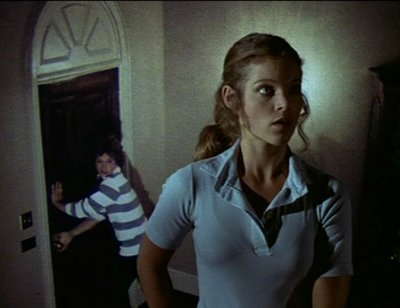 A new 35mm print of Brian De Palma's The Fury will screen at 7pm Thursday night as part of the
A new 35mm print of Brian De Palma's The Fury will screen at 7pm Thursday night as part of the 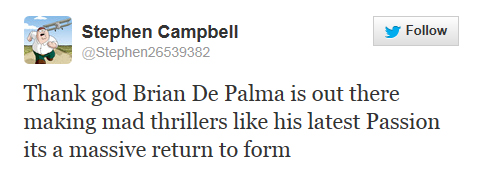
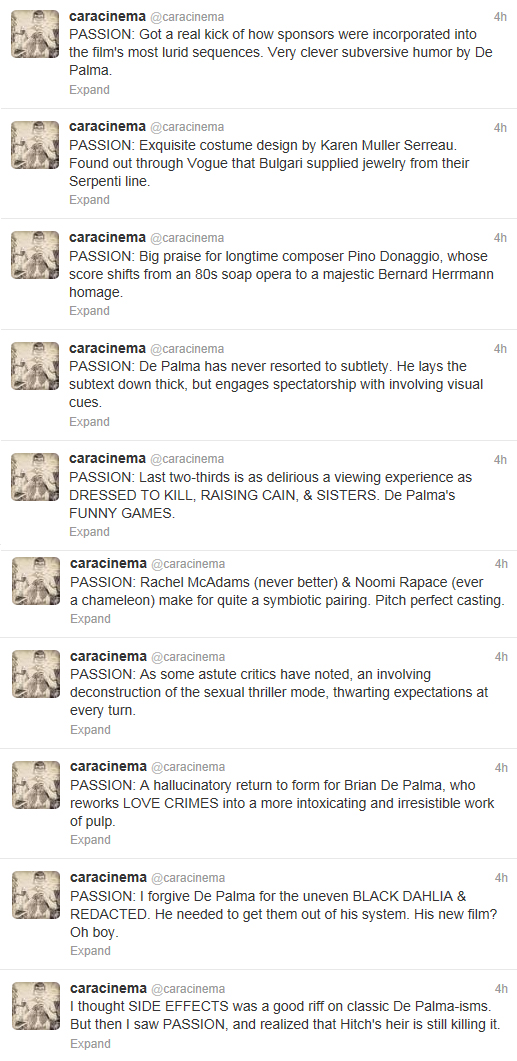
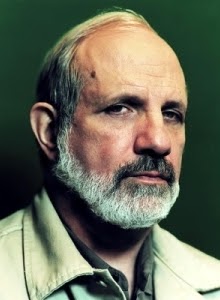
 Issue 90 of
Issue 90 of 
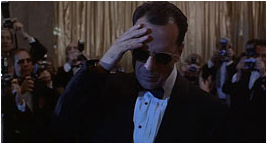

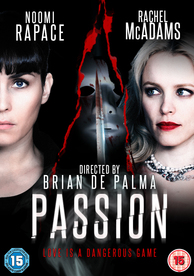 At left is Metrodome's cover for the U.K. DVD edition of Brian De Palma's Passion.
At left is Metrodome's cover for the U.K. DVD edition of Brian De Palma's Passion.